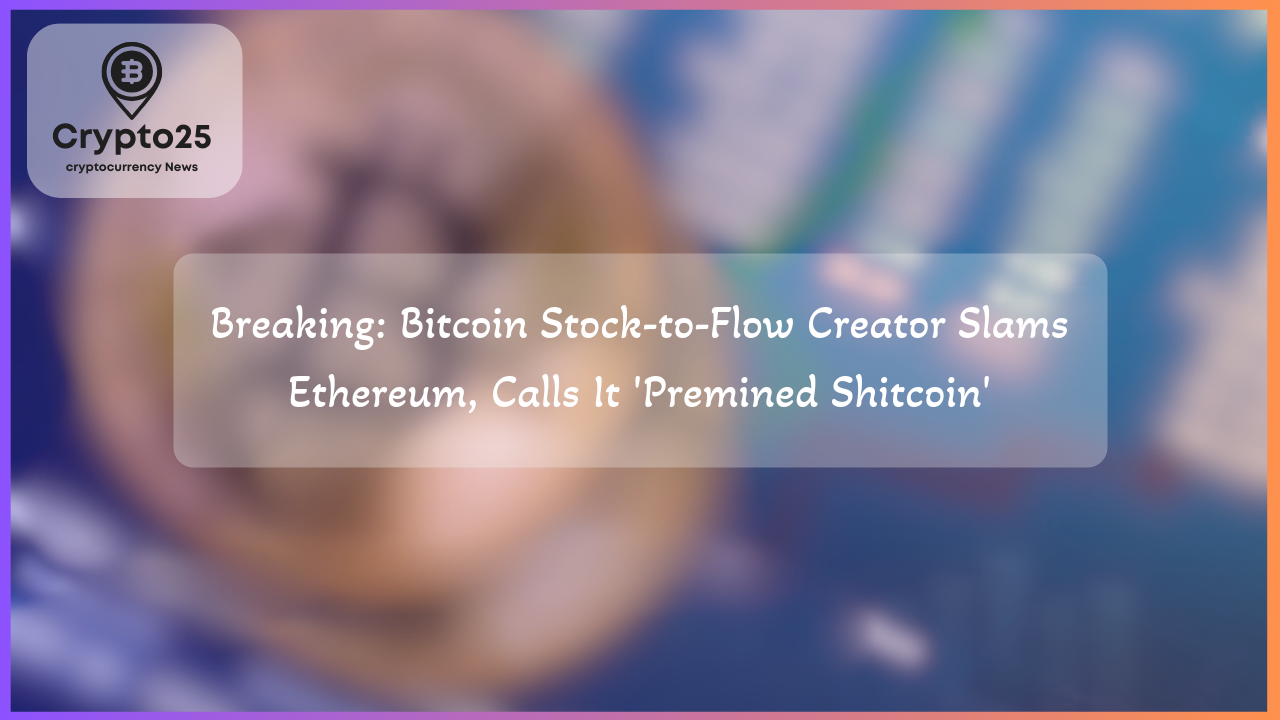
Ethereum has again become a focal point of debate within the cryptocurrency world, with the anonymous Bitcoin analyst PlanB launching a sharp critique against the project. The conversation mirrors earlier comments made by Ethereum co-founder Vitalik Buterin about Bitcoin’s Stock-to-Flow model. This exchange highlights the ongoing controversy surrounding Ethereum’s structural model and the broader crypto sector.
### Is Ethereum’s Centralized Structure a Drawback?
PlanB, renowned for his creation of the Bitcoin Stock-to-Flow (S2F) model, has reignited debate by targeting Ethereum’s core attributes. In a recent post on X, PlanB expressed skepticism about Ethereum’s decentralized claims, arguing that its reliance on proof-of-stake (PoS), pre-mined coins, and a non-fixed supply schedule positions it as a “centralized premined shitcoin.” According to PlanB, such projects harm the broader crypto ecosystem due to their governance and tokenomics flaws.
The critique echoes sentiments raised previously in the crypto community, especially regarding Ethereum’s shift from the proof-of-work (PoW) model to the more energy-efficient PoS mechanism. While this transition was celebrated for reducing environmental impact, skeptics like PlanB question its implications for decentralization and transparency. Comparing Ethereum’s current trajectory with Bitcoin’s fixed monetary policy and immutable supply schedule, PlanB argued that Ethereum’s model lacks the robustness required for long-term value preservation.
### Revisiting Vitalik Buterin’s Criticism of Stock-to-Flow
PlanB’s pointed remarks come nearly three years after Vitalik Buterin, co-founder of Ethereum, took aim at the Stock-to-Flow model. In 2022, Buterin publicly called out the S2F model for creating what he described as a false sense of “certainty and predestination” about Bitcoin’s price behavior. He claimed that such financial frameworks misguide investors into overestimating future price growth, a critique that resonated as Bitcoin’s real-world price veered from S2F predictions during a market downturn.
However, PlanB’s recent rebuttal highlights that Ethereum itself faces scrutiny over its adaptability and market performance. The Bitcoin analyst accused Ethereum of prioritizing flexibility over reliability, evidenced by its ability to modify its supply schedule at will. This inherent adaptability, claimed PlanB, puts Ethereum at odds with Bitcoin’s long-term vision of being a transparent and immutable digital store of value.
This broader conversation underscores how pivotal tokenomics models are in shaping investor confidence, particularly in distinguishing between reliable cryptocurrencies and speculative ones.
### Tokenomics and Foundation Behavior: A Matter of Trust?
PlanB’s latest comments extend beyond Ethereum’s technical foundations to include its token distribution patterns. The analyst criticized Ethereum’s monetary policy, particularly the involvement of the Ethereum Foundation in coin sales, which have raised concerns among market observers. The periodic selling of ETH by the Foundation has fueled skepticism regarding the project’s commitment to decentralization. PlanB argued that this sell-off behavior is a direct consequence of pre-mined token models, which allow early stakeholders disproportionate control.
In contrast to Ethereum, Bitcoin follows a structured and decentralized mining process, ensuring new coins are distributed equitably among network participants. PlanB emphasized how Bitcoin’s fixed supply schedule and clear monetary policy contribute to its designation as “digital gold.” Meanwhile, Ethereum’s flexibility in both governance and supply adjustments presents challenges for its potential recognition as a long-term store of value.
| Title | Details |
|---|---|
| Market Cap | $1.2 Trillion |
| Consensus Mechanism | Proof-of-Stake (PoS) |
| Supply Schedule | Flexible |
This divergence raises important questions for crypto investors as they evaluate the best avenues for long-term investments. Bitcoin, with its predictable scarcity model, may appear as a safer option compared to the inherent uncertainties tied to Ethereum’s governance practices and tokenomics.
### Ethereum vs. Bitcoin: The Debate Continues
The disagreements between proponents of Bitcoin and Ethereum highlight the ideological divides within the cryptocurrency community. While Bitcoin serves as a benchmark for decentralization and predictability, Ethereum positions itself as a dynamic ecosystem capable of evolving to support decentralized applications (dApps) and smart contracts. This adaptability, however, faces criticism for diluting Ethereum’s promise as a dependable digital asset.
PlanB’s remarks offer a reminder of the ongoing struggle for dominance in the crypto space. For investors and users alike, understanding these nuanced differences is essential for making informed decisions regarding which blockchain aligns with their values and financial goals. Ultimately, the debate between Ethereum and Bitcoin transcends personal rivalries, underlining the larger narrative about what defines a truly decentralized and valuable blockchain project.
As the industry evolves, Ethereum’s flexible model may either overcome criticisms or face greater challenges in addressing transparency and stability, while Bitcoin steadily builds on its established framework.
